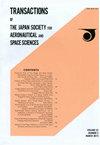基于卷积神经网络的对光照和形状变化的鲁棒陨石坑检测
IF 0.8
4区 工程技术
Q4 ENGINEERING, AEROSPACE
Transactions of the Japan Society for Aeronautical and Space Sciences
Pub Date : 2021-01-01
DOI:10.2322/tjsass.64.197
引用次数: 0
摘要
随着关于月球和火星的大量数据的收集,探索任务正在转向下一步,其目的是在预定目标上精确着陆。地形相对导航(TRN)是一种很有前途的精确着陆技术,它将从图像和地标地图中检测到的地标进行比对。弹坑探测是TRN的关键技术之一。探测陨石坑的一个问题是由于光照条件的明显变化。另一个问题是由于陨石坑的退化而导致的形状变化。本文提出了一种基于支持向量机(SVM)和卷积神经网络(CNN)相结合的陨石坑检测方法,使检测性能对明显变化具有鲁棒性。在线性支持向量机中,学习陨石坑图像数据集的梯度图像。然后使用学习到的分类器计算区域建议的客观得分。接下来,CNN将对该区域的图像进行识别,以确定它是否是一个陨石坑。结果表明,该方法可以在较宽的光照和形状条件下探测陨石坑,并且具有比传统陨石坑探测器更高的平均精度。本文章由计算机程序翻译,如有差异,请以英文原文为准。
Crater Detection Robust to Illumination and Shape Changes using Convolutional Neural Network
As a vast amount of data with respect to the moon and Mars is collected, exploration missions are shifting to the next step, the aim of which is a precise landing on a predetermined target. A promising technology for precision landing is terrain relative navigation (TRN), which collates landmarks detected from images and maps of landmarks. Crater detection is one of the essential technologies for TRN. A problem in detecting craters is the apparent change in craters due to illumination conditions. Another problem is the change in shape due to crater degradation. We propose a novel crater detection method based on combining a support vector machine (SVM) and a convolutional neural network (CNN) to make detection performance robust against apparent change. In the linear SVM, gradient images of a crater image dataset are learned. The learned classi fi er is then used to calculate the objectness score for region proposal. Next, the CNN identi fi es the image of the proposed region as to whether or not it is a crater. Our results show that the proposed method can detect craters in a wide range of illumination and shape conditions, and has better average precision than traditional crater de-tectors.
求助全文
通过发布文献求助,成功后即可免费获取论文全文。
去求助
来源期刊
CiteScore
1.80
自引率
0.00%
发文量
18
审稿时长
>12 weeks
期刊介绍:
Information not localized

 求助内容:
求助内容: 应助结果提醒方式:
应助结果提醒方式:


